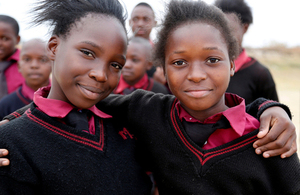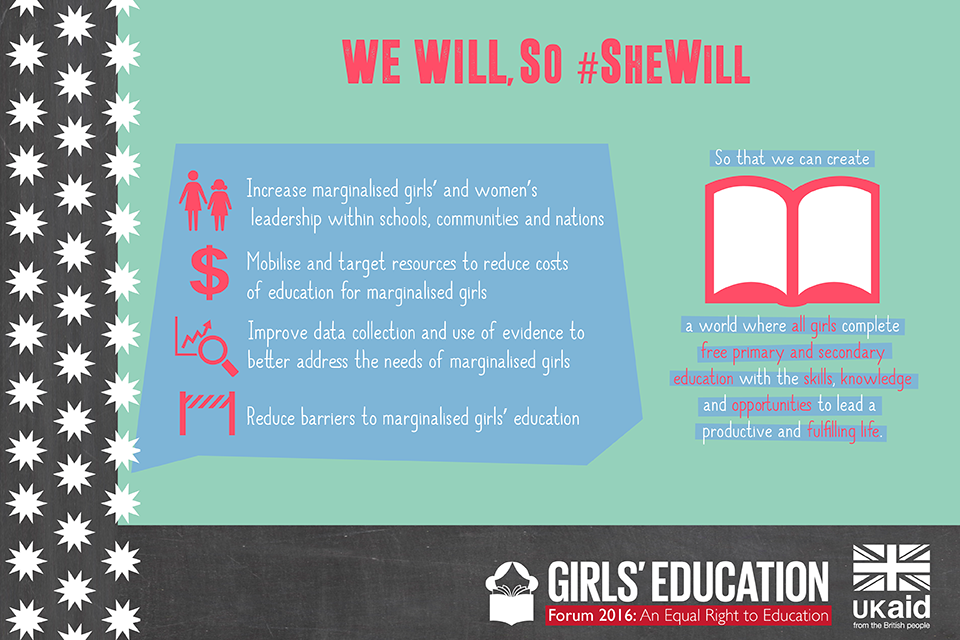Britain to help 175,000 girls in world’s poorest countries get an education
DFID will provide £100 million through the Girls’ Education Challenge to help girls who have dropped out or never attended school.

Child rights campaigners, Beauty and Hope, Zambia. Picture: Jessica Lea
The UK government will help 175,000 of the poorest, most marginalised girls in the world to get a quality education, International Development Secretary Justine Greening announced today, Thursday 7 July.
The Department for International Development (DFID) will provide £100 million through the Girls’ Education Challenge to help girls who have dropped out or never attended school due to family crises, poverty, child marriage or early pregnancy. The funding will also be used to continue the Girls’ Education Challenge’s support for 1 million disadvantaged girls across the developing world.
Greening made the announcement at the first Girls’ Education Forum. The Forum, hosted by DFID, Global Citizen + CHIME FOR CHANGE in London today, brought together governments, businesses and aid agencies to drive the implementation of Global Goal 4 to achieve universal, quality education.
Attendees also included over 150 young volunteers who have taken part in DFID’s International Citizen Service programme, which is managed by Voluntary Services Overseas (VSO).
International Development Secretary Justine Greening said:
Education doesn’t just shape individuals, it shapes countries – but right now too many young girls are deprived of an education simply because of their gender. Today’s event is about putting a spotlight on that, and focusing on what education can do to unlock prospects for girls around the world.
The UK is leading the fight for gender equality and has already helped 5.3 million girls in developing countries receive a quality education. I am proud that the UK will now be helping a further 175,000 of the most vulnerable and marginalised girls in the world to get the education they need to have choice and control over their futures.
Board Chair of the Global Partnership for Education Julia Gillard said:
Investing in girls and women isn’t just morally right: it is essential for the development of families, communities and countries.
When we educate girls, we see reduced child deaths, healthier children and mothers, fewer child marriages and faster economic growth. I congratulate Secretary of State Justine Greening on today’s announcement and her pivotal leadership on girls’ education.
Global Citizen’s Europe Director Amy Agnew said:
Today the UK has taken an important step to ensure that all girls are able to go to school and learn. Tens of thousands of Global Citizens have taken action to support this financial commitment, but there is still so much more to be done.
Globally, funding for education has been woefully neglected and still, millions of girls remain out of school. Global Citizen supports Britain’s long standing commitment to the poorest people in the world and we call on all world leaders to step up and prioritise investment in the future of girls.
Bonavitha Gahaihi, a 26 year old VSO International Citizen Service worker from Tanzania said:
When a girl is denied access to education, it impacts her whole life and her family. When a girl gets an education, her family becomes educated. Through my work with ICS I now help communities understand the importance of educating girls and help them claim their self-esteem, dignity and rights.
In addition to the UK’s commitment, the Girls’ Education Forum also secured commitments from governments, business and aid agencies, pdf 199 KB to help girls around the world get an education. These include:
-
The USA is launching a new $25 million partnership with DFID to initiate a female teacher apprenticeship programme in Afghanistan. Through this programme, adolescent girls will learn the skills needed to forge careers as teachers, enabling them to fill the teacher gap that prevents many girls from attending school.
-
Afghanistan commits to take all necessary actions, within the resources available, to accelerate gender equality and education outcomes for marginalised girls. Additionally, Afghanistan commits to increase focus on girls’ education in remote locations, and share its successful experiences with other countries.
-
Camfed commits to support 1 million marginalised girls through secondary school and into independence and secure livelihoods by 2020.
-
Cambridge University’s REAL centre commits to a new partnership with Camfed to analyse the costs of sending a marginalised girl through secondary school and improving her learning.
-
Plan UK commits to direct £30 million of its own funding and further funds it raises towards programming and advocacy on girls’ education by 2020.

Statement of Action
Over 15 organisations including DFID, USAID, World Bank, UNICEF, Plan and Pearson also signed a Statement of Action at the Forum. This focuses on what the Global Goals mean for girls’ education, and the specific actions needed to improve education outcomes for marginalised girls.
The scale of the challenge is enormous: 63 million girls around the world are out of school, with over half of these in sub-Saharan Africa. Those lucky enough to be enrolled have the odds stacked against them finishing their education. Because of this they not only face a lifetime of lower wages and fewer opportunities. Research shows that they are also more likely to marry young and to have children earlier.
Today’s commitment to help 175,000 of the most marginalised girls builds on DFID’s work getting 11 million children into school between 2011 and 2015. In September last year Justine Greening pledged that the UK will help a further 6.5 million girls get an education between 2015 and 2020.
General media queries (24 hours)
Email mediateam@dfid.gov.uk
Telephone 020 7023 0600
If you have an urgent media query, please email the DFID Media Team on mediateam@dfid.gov.uk in the first instance and we will respond as soon as possible.